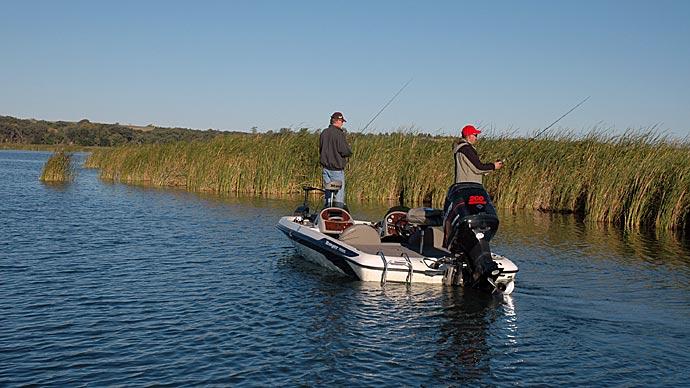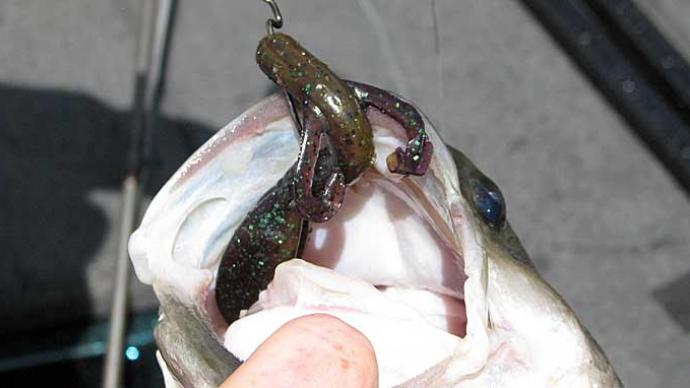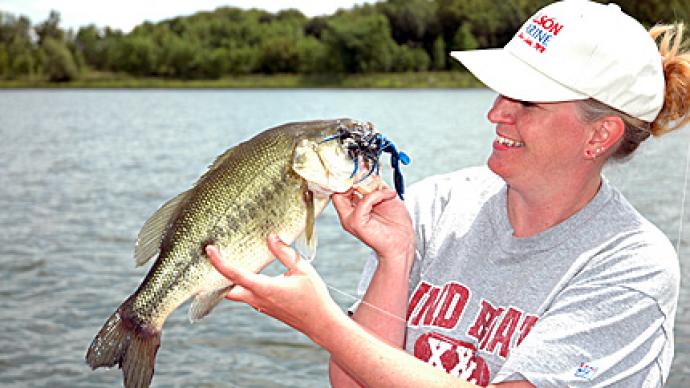| Repeated Casts |
|
If there's ever a time to make repeated casts to a piece of cover, it's on the weekends. This is when fishing pressure makes bass reluctant to bite the first thing that passes through their strike zone. You can often make these bass bite by repeatedly running the same lure past them. Try retrieving a spinnerbait down the same log or a buzzbait over a brush pile a dozen times or more. Also, repeatedly bump a crankbait over a particular stump or drop-off. The bass eventually become aggravated by the bait, or maybe they lose their fear of it. Whatever the reason, they eventually pounce on it. |
| Ugly Banks |
|
You'll often catch more bass on weekends by fishing what some anglers call ugly banks. These are typically banks that have no obvious bass cover on them. Most fishermen flock to banks dotted with boat docks, adorned with windfalls, or covered with flooded bushes, grass, or some other obvious bass cover. Obvious cover usually holds bass, but these fish know every bait made by brand and model number. Ugly, nothing banks may not hold as many bass as banks with ample cover, but the bass that live there see few lures and are more inclined to bite. Also, when you fish ugly banks, you often find isolated pieces of cover, maybe a submerged stump or log, that fishermen can't see as they boat through the area. Because the cover is isolated, any bass roaming that bank will likely stop there. This makes it a high-percentage spot to get a bite. |
| Off-Cover Bass |
|
Sometimes obvious bass cover gets fished so hard that it drives bass away. This happened once during a springtime Bassmaster tournament on Lake Norman, North Carolina, where the main pattern was fishing boat docks. After the docks had been pounded for three practice and two tournament days, they gave up a few bass. Many of the bass had been caught. But Texan Zell Rowland realized that some fish had moved away from the docks and were hanging near the shoreline between them. He fished a jerkbait in the open water between the docks and won the tournament. |
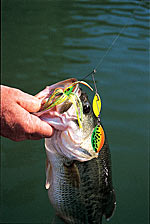
Anyone who fishes on weekdays and weekends knows bass are schizophrenic. Bass club anglers often catch bass like crazy during weekdays but struggle when they fish on the weekends, especially when competing in tournaments. One primary reason bass change personalities is the boat traffic and fishing pressure that assaults many lakes on the weekends.
Greg Marshall, president of the Kentucky Bass Federation Nation, has seen bass repeatedly shut down on the weekends. A classic example happened when he fished Percy Priest Reservoir in April while practicing for and competing in the Bassmaster Bass Club World Championship Region 3.
As part of a six-man Kentucky team, Marshall started pre-fishing Percy Priest on the Monday before the tournament. The fishing was good. Bass were jumping on spinnerbaits, shallow crankbaits, and Senko-type plastic baits. Marshal found a few shallow pockets where he could catch bass early. He concentrated on steep channel banks and bluffs for the rest of the day.
"There were probably about 80 people practicing for the tournament that week," Marshall says. "Then, starting on Friday, we had the weekend traffic to contend with."
Marshal claims the fishing pressure from the tournament anglers alone was enough to undermine the bass bite. The numbers and the size of the bass that he and his club members were catching steadily declined throughout the week. The weekend onslaught made the bite just that much more challenging. Marshal hung in and finished sixth with ten bass that weighed 17 pounds, 10 ounces.
Marshall has learned to cope with fishing pressure and the resulting skittish bass. When he finds other anglers fishing at a place he found during practice, he keeps his cool and joins the crowd. Many fishermen psych out and choose to go elsewhere rather than fish in a cluster of boats. Or, they fish the spot for a few hours and leave if they're struggling to get bites.
Though you surely get away from other fishermen when you leave a crowd, you also leave the bass you've found. If you stay with the bass, most other anglers around you will likely grow frustrated and leave. You may have the spot practically to yourself for the latter half of the day. And, with fewer boats around, you might be treated to a late feeding spree.
Marshall typically adjusts to crowded fishing conditions by changing his presentation. Say, for example, that he found bass by flippin' a jig or a Brush Hog to flooded bushes during the week when nobody was around. If other anglers are fishing his bushes on the weekend, he might flip a smaller 6-inch finesse worm. He figures the bass are still in the bushes, but they've grown suspicious of big baits due to the fishing pressure. He still gets bites by downsizing his offering.
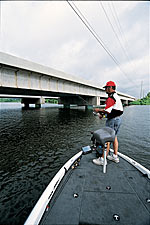
"If I see a crowd where I want to go, I usually stick with my fish," Marshall says. "I'll just do something a little bit different." If he found bass on a spinnerbait during the week, Marshal starts with this type of lure when he fishes in a crowd on the weekend. But, again, he shows bass something different.
Consider a tournament on Kentucky Lake where Marshal was plucking bass from grass beds with a spinnerbait that sported a turtleback blade behind a small Colorado stripper blade. He smoked the bass while fishermen around him got a few bites on spinnerbaits with standard Colorado and willow leaf blade combinations.
"I was just whacking the bass with that turtleback bladed spinnerbait," Marshall says. "It gave the bass a different look from what everybody else was throwing."
Like most fishermen, Marshall loves to catch bass on top. He might fish topwater baits on weekdays while fun fishing or to locate bass while practicing for a tournament. But he rarely does so on weekends. He claims that the topwater bite is too unpredictable and that it's the first thing to dry up when a lake is overrun with boat traffic and fishermen.
"Even if I catch bass on something like a buzzbait or popper in practice, I'll start in the same area with subsurface bait on the weekend," Marshall says. "I'll usually do better with something like a Senko or a shaky head worm."
If he can find bass on offshore structure, Marshall believes he has an advantage on the weekend. He claims that many anglers don't know how to fish offshore and that these fishermen are stuck fishing shallow in crowded water. Since offshore bass see fewer lures, they are more inclined to bite on the weekends.
The problem with fishing offshore on the weekend is boat traffic. On lakes with heavy traffic from cruisers and water skiers, you'll need to lean on a pole seat to avoid being tossed overboard. The constant waves make it challenging to hold within casting range of ledges, brush piles, and other deep bass hideouts. But the effort often pays off with heavy catches.
On power-generating reservoirs like Kentucky and Barkley Lakes, current flow caused by the turbines puts offshore bass on the feed. The bass typically suspend over deep water near creek and river channel ledges when there is no current, which makes them hard to find and catch. When the dam sucks water for the turbines, the ensuing current draws bass to the ledges, where they nab baitfish.
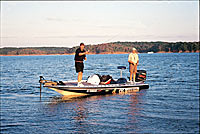
The turbines operate fairly regularly during the week to generate power for businesses and factories. Anglers tuned into the schedule and know the locations of productive offshore structures can practically call their shots on the weekdays. However, the need for power generally subsides on the weekends. This results in little or no current and a slow bass bite.
When the current rolls on the weekdays, Marshall often makes hay by cranking channel ledges and deep brush piles with Norman's Deep Little N and DD-22. A Carolina rig with a Zoom Ultra-Vibe Worm also scores well then. He fishes the same places on the weekends when the water is slack but slows down and tempts bites with a shaky head jig and a drop-shot rig.
"You have got to adjust on the weekends," Marshall says. "On sunny days, the bass will hold to the cover without the current. On cloudy days they're more likely to suspend away from the cover."
If the bass are suspended, Marshal relies on a drop-shot rig. He looks for bass with his graph to determine where and how high they are suspended above the bottom. Then he lets his drop-shot rig sink straight down to the bass. If the bass are suspended well above the bottom, his drop-shot weight never touches down.
You can't beat weekdays for catching bass and for finding fish before a tournament the following weekend. Just avoid getting stuck on weekday patterns when the weekend rolls around. You'll probably need to show the bass a more subtle bait on the weekends, but they're likely to be right where you found them during the week.
Reprinted with permission from


